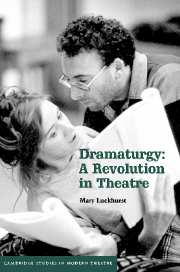Book contents
- Frontmatter
- Contents
- List of illustrations
- Acknowledgements
- List of abbreviations
- 1 Introduction
- 2 Gotthold Lessing and the Hamburg Dramaturgy
- 3 Dramaturgy in nineteenth-century England
- 4 William Archer and Harley Granville Barker: constructions of the literary manager
- 5 Bertolt Brecht: the theory and practice of the dramaturg
- 6 Kenneth Tynan and the National Theatre
- 7 Dramaturgy and literary management in England today
- 8 Conclusion
- Select bibliography
- Index
5 - Bertolt Brecht: the theory and practice of the dramaturg
Published online by Cambridge University Press: 22 September 2009
- Frontmatter
- Contents
- List of illustrations
- Acknowledgements
- List of abbreviations
- 1 Introduction
- 2 Gotthold Lessing and the Hamburg Dramaturgy
- 3 Dramaturgy in nineteenth-century England
- 4 William Archer and Harley Granville Barker: constructions of the literary manager
- 5 Bertolt Brecht: the theory and practice of the dramaturg
- 6 Kenneth Tynan and the National Theatre
- 7 Dramaturgy and literary management in England today
- 8 Conclusion
- Select bibliography
- Index
Summary
Brecht's theory and practice of the dramaturg have brought systematic institutional and artistic reforms to German-speaking, central and Eastern European theatre. There dramaturgs in Brecht's mould are at the heart of theatre practice and operate quite uncontroversially. In Canada and the United States the professionalisation of the dramaturg has occurred since the 1970s and is now well established, though always accompanied by a good deal of hotly contentious debate. In non-German-speaking Western Europe the appointment of dramaturgs is a familiar practice in Scandinavia, Holland and France, whereas in Britain and Spain dramaturgs tend to be deployed on short-term projects, are not regarded as integral to theatre-making, and there is a greater confusion about what they do. In Britain, whilst there is no question of Brecht's international status as a playwright, nor of his place as one of the most significant theatrical thinkers of the twentieth century, the official recognition of dramaturgs is much more recent and the numbers employed have sharply increased over the last five years. What is most odd is that although the practice of Brechtian dramaturgs has demonstrably had an enormous influence in the West since the 1960s, Brecht's actual theorisations on the dramaturg have scarcely been addressed at all. This has led to considerable misunderstanding and misrepresentation.
Brecht's theory and practice of the dramaturg spread to the English-speaking West in the 1960s and 1970s, mainly through the discipleship of directors and dramaturgs either working at or formerly employed at Brecht's theatre, and through John Willett's 1965 translation of Der Messingkauf.
- Type
- Chapter
- Information
- DramaturgyA Revolution in Theatre, pp. 109 - 151Publisher: Cambridge University PressPrint publication year: 2006

